15 One Season Blunders
You can find plenty of features on the ’net championing shows that ended too soon. But here are 15 telefantasy travesties that couldn’t be off our screen soon enough
15 Blade The Series (2006)
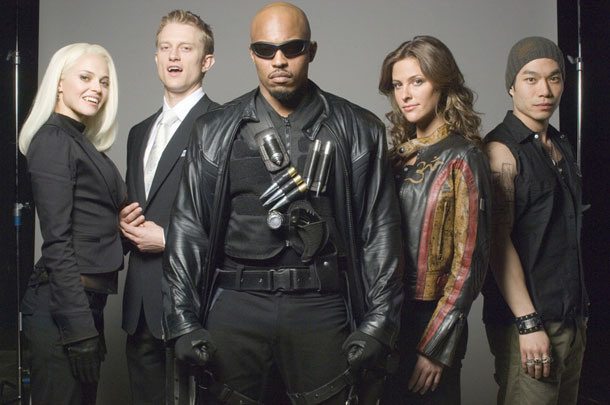
Number of episodes: 12
What was it? Spike TV’s attempt to bring the Blade franchise to TV.
Why did it suck? Two words – Sticky Fingaz (or Kirk Jones, as his mother knew him). To be fair, the show itself wasn’t all that bad, a kind of embryonic True Blood with its vampire politics and kinkiness. But we really, truly couldn’t have stuck another season of Fingaz’s plank-like interpretation of Blade. It’s not like he’s a character who requires significant acting talent (Wesley Snipes managed okay for three films) but Fingaz was in a class all of his own when it came to acting, and even in that class he was forced to sit in a corner with a dunce’s hat on. He couldn’t even perform the stunts with any elegance. The writers seemed aware of this gaping great vacuum at the heart of the show and gave him less and less to do as the series wore on; in some episodes he was barely on screen for more than a couple of minutes. The only way we would have liked to have seen this series live on is if the producers had done a Blake’s Seven and carried on without their lead character.
.
.
14 Point Pleasant (2005)
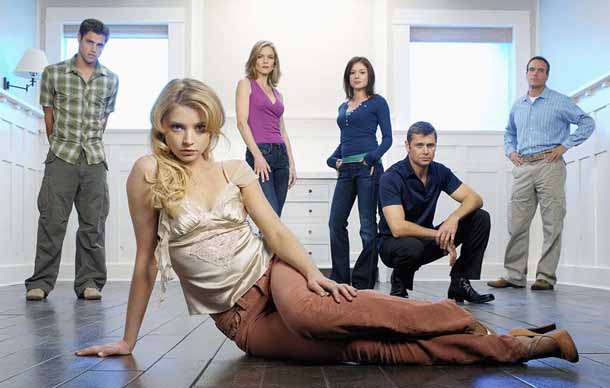
Number of episodes: 13
Weekly digests, tales from the communities you love, and more
What was it? A supernatural soap about a mysterious girl – Christina – was washes up (literally) in a sleepy coastal town. Unfortunately, she has an uncontrollable ability to heighten the negative emotions of those around her.
Why did it suck? For a start, it replaced the axed Tru Calling , thus immediately earning enmity for depriving Eliza Dushku of more screen time. The central mystery was tediously protracted and unengaging, and after 13 episodes it still seemed to be going nowhere slowly. The townsfolk of Point Pleasant were a dull bunch, and Christina’s power only made them even more unlikeable. The supernatural elements were played down in favour of by-the-numbers “human conflict”. The show was acted and directed like it was in constant state of po-faced, overwrought haute tension , but rarely delivered any killer blows.
.
.
13 Highlander The Raven (1998)
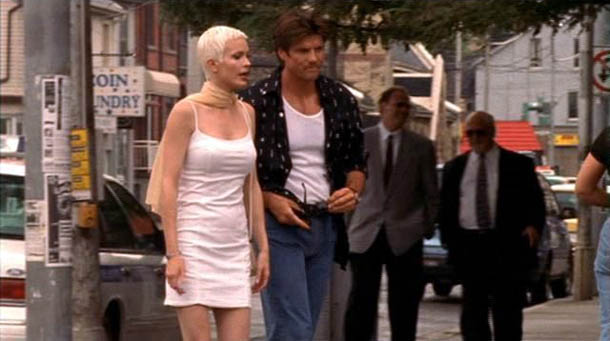
Number of episodes: 22
What was it? A last gasp extension to the TV Highlander franchise with the depressingly obvious twist of a female lead.
Why did it suck? It spent half a season desperately trying to be different to Highlander: The Series and giving us a flaccid, hand-me-down “buddy cop show” formula instead. Then, as if realising that wasn’t working, it resorted to a more recognisable Highlander format that just made you wish you were watching the superior, original show instead. The two leads – immortal thief seeking redemption (yawn) Amanda (Elizabeth Gracen) and cop Nick Wolfe (a name surely created using an online Grizzled Cop Name Generator, and played by Paul Johansson) had zero chemistry. Even Gracen’s look – check-out-girl doing a Brigette Nielsen impression – was horrendously dated. The whole affair had the whiff of cynicism about it.
.
.
12 Earth 2 (1994)
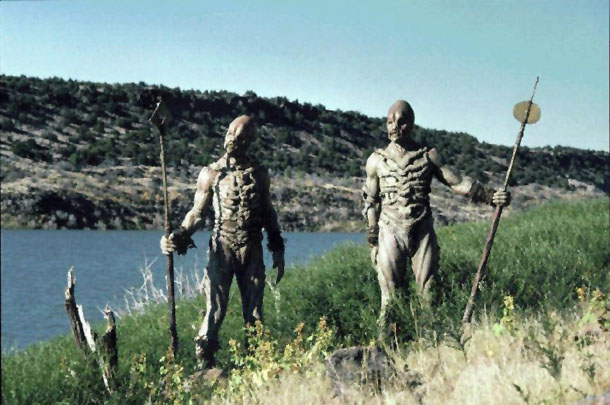
Number of episodes: 22
What was it? A Spielberg-produced series about a spaceship of colonists journeying to an alien planet to try to find a cure for a disease that is wiping out humanity on Earth. Unfortunately the ship crash lands, scattering the colonists across the planet.
Why did it suck? Zzzzzzzzzz… wake us up when it’s over. Spielberg has been the producer on some great TV series over the years ( Band Of Brothers , The Pacific ), and as a film producer and director he has an eye for crowd-pleasing sci-fi. But whenever it comes to small-screen sci-fi, his name in the credits seems to a guarantee of humourless, dreary, slow-moving, overly-worthy tosh (see also Taken and Falling Skies – seaQuest is the exception; it was tosh, but at least it was pacy, frothy tosh). Earth II was the worst offender by far, a virtual remake of Lost In Space season one with all the fun sucked out. Pompous, slow-moving and visually drab (despite some silly looking aliens) it was as much fun as your car breaking down in the middle of a desert.
.
.
11 New Amsterdam (2008)
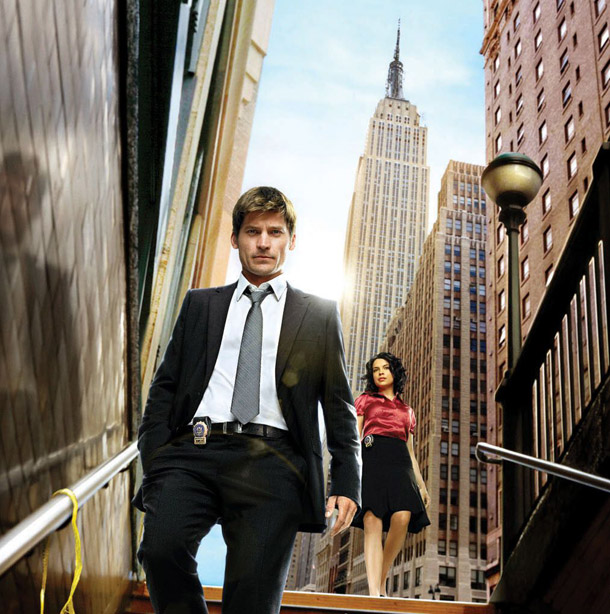
Number of episodes: 8
What was it? A show about a 400-year old immortal cop who can only die when he finds true love, and who used his personal experience of history to solve crimes.
Why did it suck? Imagine if Highlander didn’t have the sword fights, or if Angel wasn’t a vampire – how interesting do you think those shows would be then? Because that’s what New Amsterdam is: a show that reheats a lot of old “immortality” clichés (flashbacks, the pain of losing loved ones, the ennui of centuries of existence) but without any new twist. Hell, without any twist. The lead guy is just some bloke, with clearly a way too high expectation of women, if the amount he’s slept with but still hasn’t found “true love” is anything to go by. Has he considered he might be gay?
.
.
10 Manimal (1983)
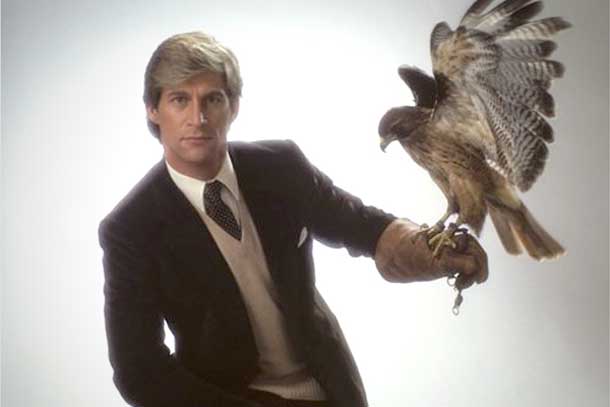
Number of episodes: 8
What is it? Man can change into animals, and so helps police solve crimes.
Why did it suck? If you’re old enough, you may have fond memories of this show, but it’s about as harsh a lesson on the dangers of nostalgia as you could possibly get. Silly, cheap and plotted by the same chimps who were trying to rewrite the complete works of Shakespeare, the best thing about Manimal was its title. Sure, the pilot had some halfway decent transformation FX created by Stan Winston, when hero Dr Jonathan Chase (played by Casualty ’s Simon MacCorkindale) transforms into a panther and an eagle. But then, suspiciously – despite the fact he can turn into any animal – in subsequent episodes he invariably turns into eagles and panthers again, because that’s the stock footage the producers have hanging around. If he does change into anything else, he usually does so out of shot, handily. It’s also odd that when he transforms into an animal he rips his clothes off, but when he transforms back, he clothes seem to be perfect again. There was little animal magic to see here.
.
.
9 The Prisoner (2009)
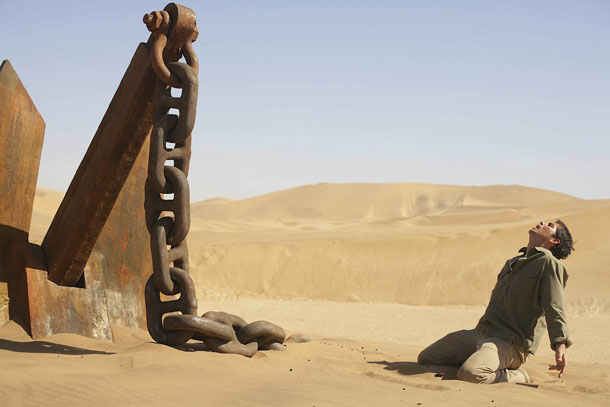
Number of episodes: 6
What was it? An attempt to update The Prisoner for the information age.
Why did it suck? A morass of missed opportunities, gratuitous weirdness, incomprehensible plotting and James Caviezel’s vacuous central performance, the 2009 update of the ’60s classic was, frankly, a chore to watch. Which was a shame, as most people had given up on it by the time it got the final episode and delivered a halfway decent denouement (or maybe we were just suffering from Stockholm Syndrome by that point). There was something fundamentally dramatically wrong this version of The Prisoner from the word go. In the original a major part of the appeal is that even though the audience doesn’t know who Number Six is or why he resigned, he does. He’s just not telling. This is what gives the edge to his mind games with the various Number Twos. It’s what makes the episodes fun to watch. In this remake, Number Six starts off with some form of amnesia. Immediately, all that potential tension vanishes in a puff of smoke to be replaced by Caveizel looking baffled and confused. If he doesn’t know why he’s in the Village, why should we care? It’s a debilitating fundamental change to the format and robs the series of much of its cat-and-mouse fun.
.
.
8 Kingdom Hospital (2004)
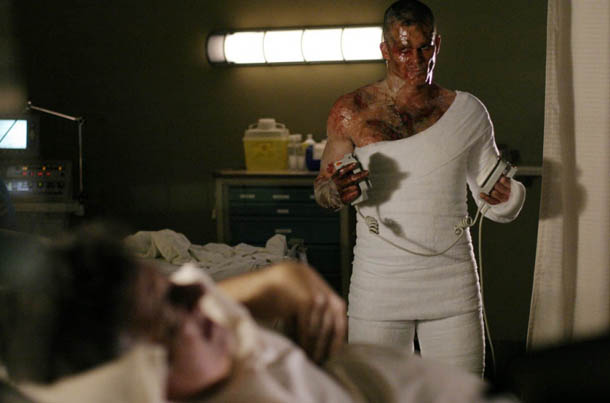
Number of episodes: 13
What is it? A US remake of Lars Von Trier’s Danish mini-series about a freaky hospital, scripted by Stephen King.
Why did it suck? Aiming to be some kind of Twin Peaks meets St Elsewhere , Kingdom Hospital was a bunch of ideas that were never crafted into anything actually resembling a coherent script. As with The Prisoner , it revelled in “surreal-for-surreal’s sake”, randomly inserting things like an operating team singing “Na Na Hey Kiss Him Goodbye” with no rhyme or reason and giving secondary characters wacky character ticks – like a nurse who’s scared of blood – for the hell of it. There are ghosts, and psychics, and telepaths, and a giant anteater with ferocious teeth who’s the embodiment of the Egyptian God of the Dead. The main character is comatose for much of the time – clearly an audience identification figure. It’s also glacially slow, with some episodes leaving you wondering if you’ve seen anything that’s advanced the plot at all. And if you ever wanted the purest example of “collapsing audience figures” ever, here are the numbers in millions, in order for the entire run: 14 , 8.5 , 7.1 , 5.4 , 5.1 , 3.7 , 3.5 , 3.8 , 2.6 , 3 , 2.6 , 2.4 , 3.7 .
.
.
7 Galactica 1980 (1980)
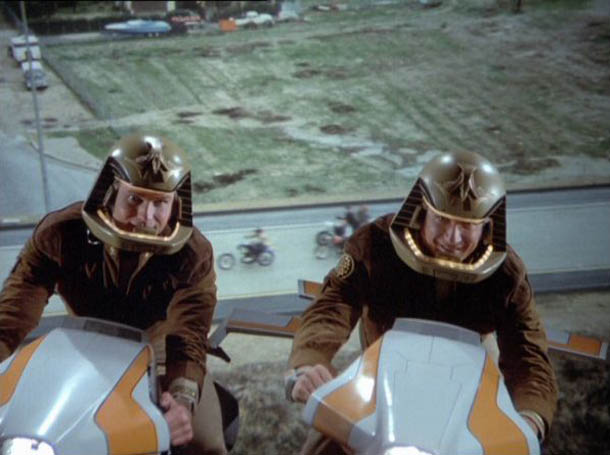
Number of episodes: 10
What was it: The “sequel” to Battlestar Galactica once the ship had found Earth.
Why did it suck? Let’s count the ways: 1) Annoying super-intelligent kid; 2) No Starbuck (apart from one episode, by far the best, which isn’t set on Earth and feels like a flash back to the original show); 3) The Super Scouts – a bunch of Galactican kids who have to be babysat through various episodes; 4) Distinct lack of Cylons (and when they do show up they gatecrash a Halloween party – no kidding!); 5) Distinct lack of spaceship action; 6) Lots of stock footage; 6) Episodes about the Space Scouts helping out on an ailing farm or playing baseball; 7) No Apollo; 8) Stupid gimmicks like flying motorbikes. Near unwatchable, really.
.
.
6 Paradox (2009)
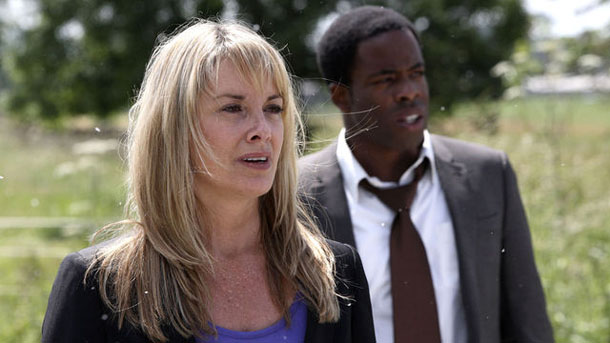
Number of episodes: 5
What was it? BBC show about mysterious photos from space helping to solve crime.
Why did it suck? Although it didn’t exactly suck (the scripts had some genuinely intriguing elements and twists) Paradox became a running joke for the outrageous leaps of logic made by its team of investigators, and the bizarre nature of its premise. A series of random, blurry photos would be beamed from space (we never did find out why) packed with little Easter Eggs that, if decoded, helped prevent a future crime (it was kinda like Minority Report meets Flickr ). “Oh look,” one of the characters would say, “this fuzzy picture of an egg has a blue poster in the background.” “Gosh,” another character would respond, “I passed a cafe this morning serving eggs… and across the road was blue poster !” “Quick,” a third character would say, “get down to cafe and prevent a nuclear bomb from exploding while I stay here and argue with the testy but kinda sexy scientist guy/snog my ex-partner who I’m not totally over yet.”
The series also shot itself in the foot badly by striving to prove it wasn’t just sci-fi. It so desperately wanted to be taken seriously by a non-genre audience, that the direction, the acting, the action and the dialogue seemed to be in a constant competition to prove which could be the most “proper telly”. Oddly, this just had the effect of making the whole thing feel even more artificial, contrived and off-putting to watch. The characters, especially, were front-loaded with issues and antagonisms that made them come across as mere script constructs rather than living, breathing personalities. Tamzin Outhwaite was especially unconvincing in the lead role (tellingly, in pre-publicity she was the worst offender when it came to the “This isn’t sci-fi!” shtick) , though the guy playing her bible-bashing colleague wasn’t far behind in the “I hope my mates aren’t watching this” stakes.
As with Blade , we could stomach a second season if there were a complete overhaul of the cast (except the mad scientist guy, he was cool) and a tighter scripts that made the photos feel like something cleverer than the picture round at a pub quiz.
.
.
5 Mercy Point (1998)
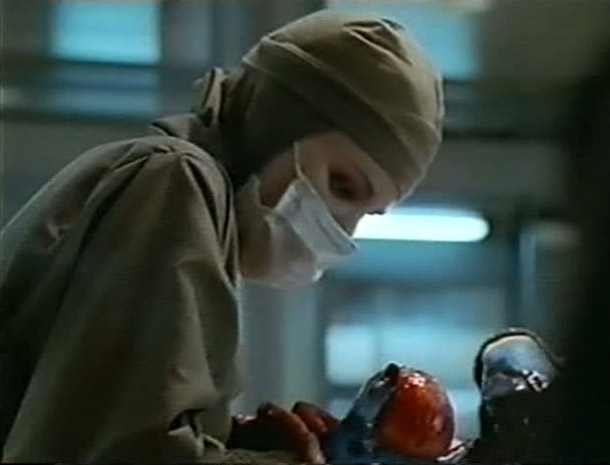
Number of episodes: 8
What was it? Babylon 5 meets ER.
Why did it suck? There is a good show to be made from a medical drama/sci-fi mash-up. This wasn’t it. By a long shot. Trite, obvious and cheesy, the medical issues were depressing mundane (the pilot featured a “recapitation” and a computer virus that attacks humans) and the regular characters ham-fistedly carved from purest cliché (yes, there’s an android nurse struggling with burgeoning emotions). There was nothing in this show that hadn’t been covered dozens of times before – and infinitely better – in various “medical” episodes of Trek and Babylon 5 . An utterly pointless, shoddily by-the-numbers, cheap-looking, missed-by-no-one mild irritation in SF history.
.
.
4 Painkiller Jane (2007)
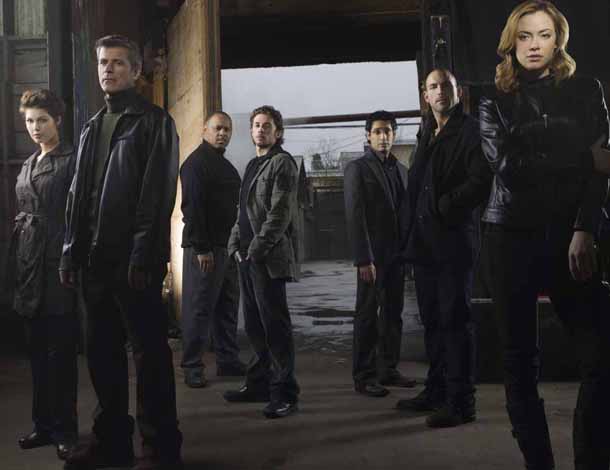
Number of episodes: 22
What was it? Syfy’s small screen version of the comic book character Painkiller Jane, who has amazing regenerative powers
Why did it suck? Kristanna Loken is a terrible actress – there’s a reason she was near-silent in Terminator 3 . Her voiceovers make Harrison Ford’s Blade Runner narration sound like Olivier doing Shakespeare. None of the team are likeable, and their banter feels forced – this show could have learned things from the first season of Torchwood , which is saying something. And the show was so cheap, there are two “clips” episodes in that single season. Does that smack of desperation or what? Cheap, not very cheerful.
.
.
3 Krod Mandoon And The Flaming Sword Of Fire (2009)
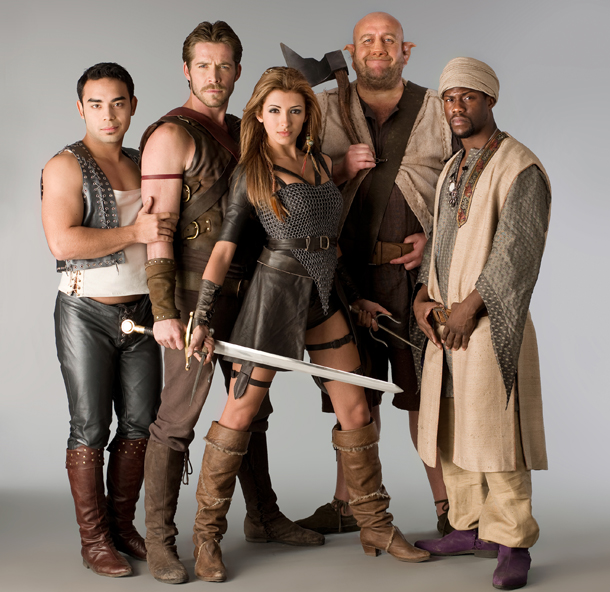
Number of episodes: 6
What was it? A BBC sit-com lampooning fantasy clichés, starring Tegs from Grange Hill and Matt Lucas.
Why did it suck? Pooh. Willy. Fart. Bum. Arse bandit. Dog’s bollocks. Burp. Nancy boy. Flaps.
Are your sides splitting? Thought not. Still, we’ve saved you the bother of ever having to witch this bilge.
.
.
2 Crime Traveller (1997)
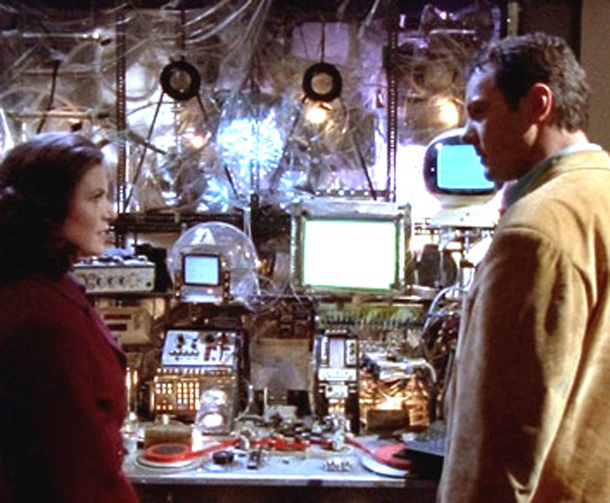
Number of episodes: 8
What is it? BBC show starring him from EastEnders and Casualty and ’er from the arse-end of Red Dwarf , about a cop who can travel back in time one day to solve crimes.
Why did it suck? Ah, the show that was once SFX ’s favourite bête noire until the one that wins the number one place came along. Which seems like a good excuse to reprint our original review from issue 25, written by former Blake’s Seven scripter Chris Boucher, because it’s a corker:
“The accepted wisdom holds that you could broadcast any old crap after The National Lottery Live and not only would it look like quality by comparison, it would also inherit viewing figures to die for. With Crime Traveller , the BBC are clearly testing this theory to destruction. There’s a basic contempt here which doesn’t even pay the viewer the back-handed compliment of cynical exploitation.
“Jeff Slade is an unconvincing policeman (played equally unconvincingly by Michael French) who discovers that Holly Turner, the divisional Science Officer and closet quantum physicist, is in possession of a secret time machine. Science officer? Are we talking a cooler version of the civil service grade here? Or maybe it’s the starship rank: Chloe Annett’s performance certainly suggests a transporter-lagged alien.
“To cut a short story shorter, Slade persuades Turner to take him back to before certain crimes happened, to solve the mysteries of who-dun-’em. Actually, the only real mystery is how this stuff got into production in the first place.
“After an absurd first episode of clumsy low-budget action sequences interspersed with half thought-out time lore (a case in point: Turner drives home, parks her car, travels three hours into the past, and then drives off in her car... Er, which was somewhere else three hours ago), the series soon settles down in the better-shot second episode, whereupon it becomes simply ludicrous.
“The death, a poisoning, happens at lunchtime, at say 12.30pm or 1pm. Police are called and the cause of death is established (presumably by post mortem). Poison and assumed method of administration are swiftly identified. Witnesses are then questioned. Suspects are eliminated and allowed to return to work as normal. Fingerprints are then taken, compared and identified. And, finally, an arrest is made post haste...
“And it’s still only 3.45pm! That’s impressive, isn’t it? Well, no, actually. It’s just plain stupid and careless, and the result of dumb plotting which is driven by the belief that the punters won’t notice such details. Just as they won’t notice the same wire cages turning up as police holding pens – police whats? – and, with the addition of a stick-on key pad, as the security section in which a chemical firm’s poison stocks are kept.
“This programme stinks, which would just about be forgivable if it had any discernible ambitions other than to avoid giving offence, making a profit for the producers and filling a prime-time slot for the BBC. It’s the sort of lazy, undemanding blandness which delights a lot of pressure groups, not least the satellite and cable interests.
“Time machines only go backwards, we’re told (a prime example of the series’ sloppy logic: this is because the future doesn’t exist yet. But that part of Slade’s future which lies in the past already does, as the evidence of his presence proves). It seems British SF TV is doing the same. Terry Nation died in the week following the show’s première. A bleak coincidence or what?”
.
.
1 Flash Gordon (2007)
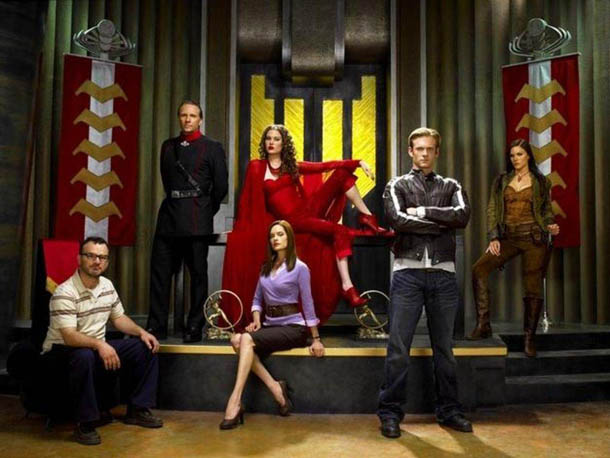
Number of episodes: 21
What is it? F**k knows, but it’s not Flash Gordon .
Why did it suck? Few shows achieve such awesome across the board awfulness as Syfy’s bargain bin de-imagining of Flash Gordon . From concept to execution it’s an off-key symphony of brain numbing awfulness. Not even lip service is paid to space opera, as Flash instead hops back and forth between his leafy American small-town home and Mongo via some handy, cost-saving portals (just hit the “stargate” button on your keyboard again, Mr FX technician). Oh and did we mention this Flash is a marathon runner who lives with his mum, even though he’s clearly pushing 30? Not very flash, is it?
And these are probably the least offensive of a series of pointless updates. Zarkov is now the comedy sidekick. Ming, boasting a full head of hair, looks like the most evil thing he’s ever done is turn someone down for a loan. The Hawkmen are wingless, but have cloaks they flap about like flasher macs while going, “Raaaarrrr! Raaaaarrrr!” as they bob up and down. Mongo is in the grip of a water shortage, and this is what enable Ming to maintain power. It also means Flash could lead a revolution by popping back through a portal and buying a few crates of mineral water.
Mongo City appears to be a reused set from a CBBC quiz show. The costumes look like they’ve been designed by the work experience guy (the one who turned up to help with catering). The FX at least evoke a sense of wonder – you wonder if they FX team are all working under pseudonyms so they can get jobs afterwards. And underpinning everything – and therefore making sure the whole lot falls down spectacularly – are scripts so silly, so slight, so utterly bereft of tension or drama, they ought to come with a health warning.
Flash Gordon – the show your off-switch was designed for.
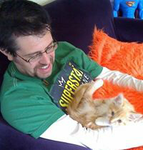
Dave is a TV and film journalist who specializes in the science fiction and fantasy genres. He's written books about film posters and post-apocalypses, alongside writing for SFX Magazine for many years.


